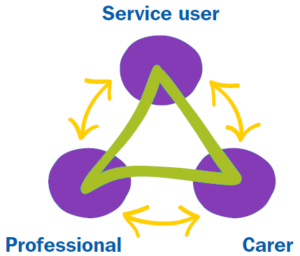Working with family, friends and carers
Family, close friends and carers are crucial components to the recovery of a person with mental illness. Therefore, the people who care for those with a mental illness must be supported to be fully engaged in all stages of carers.
The concept of a triangle of care model has proposed by many carers who wish to be seen as active partners within the care team. It is seen when there is collaborative three-way partnership between service provider, patient and carer. This approach should involve family, close friends and carers in all stages of the process including assessment, care planning, treatment, referrals, and discharge planning as well as decision-making in areas such as aftercare provision, housing and employment support.
Key principles for working with family, friends and carers of people with a mental illness
- Recognise who the family, close friends and carers are and acknowledge the importance of their role.
- Always welcome family, close friends and carers and enquire about their reason for visiting or contacting the service.
- Validate that family are not at fault for a loved one presenting with BPD.
- Request information from family, close friends and carers to assist with the care and support of the person with mental illness.
- Provide information about your service, including its purpose and how it can be contacted.
- Provide information about carer rights and responsibilities.
- Ask if carers have any questions and do your best to answer them.
- Explain what can and cannot be discussed.
- Refer family, close friends and carers to separate carer information and support services.
- Ensure family, close friends and carers are fully engaged in all stages of care.
Adapted from A practical guide for working with carers of people with a mental illness.
Guidelines
Project Air Strategy – Family, Partner and Carer Intervention Manual for Personality Disorders (2016) is designed for working with families, partners and carers of people with personality disorder, emerging personality disorder, symptoms or traits.
Project Air Strategy – Parenting with Personality Disorder Intervention (2015) is a manual for mental health professionals designed to provide a brief parenting intervention for mental health workers to assist people with personality disorders to strengthen and enhance their parenting skills.
Training resources for service providers
The Private Mental Health Consumer Carer Network (Australia) Limited developed Implementing the ‘Practical Guide’ online training module to inform and support health professionals on how to involve consumers and carers in meaningful ways into patient centered care models.
Download A practical guide for working with carers of people with a mental illness, a guide book designed by the Private Mental Health Consumer Carer Network (Australia) Limited.
Books
For more information
Siblings Australia – Professionals working with siblings of children and adults with disabilities




